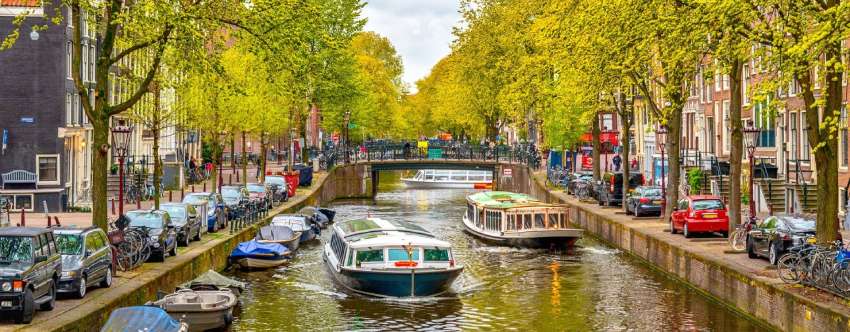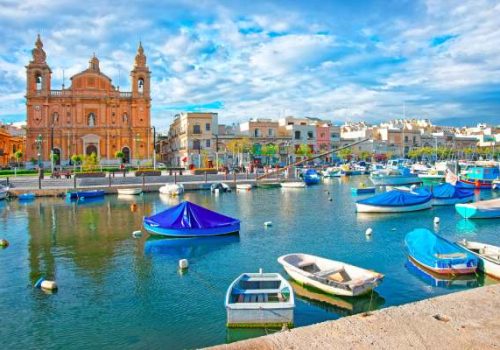Live and work in Amsterdam
Amsterdam, the capital of the Netherlands, is one of the most vibrant and cosmopolitan cities in Europe. Known for its iconic canals, rich history, progressive values, and bustling economy, Amsterdam offers a unique mix of urban charm and cultural richness. Its reputation as a global hub for innovation and creativity, combined with its high quality of life, makes it a top destination for expats and professionals. This guide provides a comprehensive overview of living and working in Amsterdam, including job opportunities, accommodation, cost of living, and tips for thriving in this dynamic city.
Current job offers in Amsterdam & the Netherlands
Unfortunately, we have not found any jobs that match your search criteria. If you scroll down, you will find a selection of the most popular job offers.
- Customer support
- Portugal
- Customer support
- Latvia
- Hotel jobs, Tourism
- Cyprus, Greece, Spain
- Customer support
- Portugal
- Customer support, Marketing
- Portugal
Working in Amsterdam
Working Conditions in Amsterdam
Amsterdam offers a well-balanced work environment, emphasizing employee rights and quality of life. The standard workweek is 36 to 40 hours, typically from Monday to Friday, though flexible and part-time arrangements are common. Employees are entitled to at least 20 days of annual paid leave, and many companies offer more, often up to 25 or 30 days. Additionally, public holidays like King’s Day and Liberation Day contribute to a generous amount of time off.
Dutch labor laws are designed to protect workers, ensuring fair pay, reasonable working hours, and comprehensive benefits. Parental leave, including maternity and paternity leave, is among the most progressive in Europe, allowing parents to balance work and family life effectively. English is widely spoken in the workplace, particularly in international companies, though learning Dutch is beneficial for integration and expanding career opportunities.
Job Opportunities in Amsterdam
As a key economic hub in Europe, Amsterdam offers diverse job opportunities across various sectors. The city’s robust economy is driven by industries such as technology, finance, creative industries, logistics, healthcare, and tourism.
Technology and Start-ups: Amsterdam is a leading tech hub, often referred to as the “Silicon Valley of Europe.” Home to major companies like Booking.com, TomTom, and Adyen, as well as numerous start-ups, the city offers roles in software development, data science, AI, and cybersecurity.
Finance and Banking: The financial sector is strong in Amsterdam, with institutions like ING, ABN AMRO, and Rabobank offering positions in investment banking, fintech, and compliance.
Creative Industries: Amsterdam is a global hub for advertising, design, and media. Companies like Wieden+Kennedy and MediaMonks provide opportunities for professionals in graphic design, digital marketing, and content creation.
Healthcare and Education: The healthcare sector consistently seeks qualified professionals for roles in nursing, medicine, and administration. Amsterdam’s international schools and universities also hire expats for teaching and research positions.
Tourism and Hospitality: As a major tourist destination, Amsterdam’s hospitality industry offers numerous roles in hotels, restaurants, and event planning.
Networking is vital for job seekers. Platforms like LinkedIn, local job boards such as IamExpat.nl, and recruitment agencies specializing in expat placements can help you find opportunities.
Salaries in Amsterdam
Salaries in Amsterdam are competitive, reflecting the city’s high cost of living. The average annual gross salary is approximately €40,000, though earnings vary by industry and role:
- Technology and IT: €50,000–€80,000 annually
- Finance and consulting: €55,000–€90,000
- Healthcare professionals: €35,000–€70,000
- Creative industries: €30,000–€60,000
- Hospitality and retail: €25,000–€40,000
Many companies offer additional benefits, including relocation packages, healthcare allowances, and performance bonuses, which enhance the overall compensation.
Income Tax in Amsterdam
The Netherlands uses a progressive income tax system, with rates ranging from 37.07% to 49.50%, depending on income levels. Expats may qualify for the 30% ruling, a tax benefit that allows up to 30% of their gross salary to be tax-free for the first five years, significantly increasing take-home pay.
Social security contributions, which fund healthcare, pensions, and unemployment benefits, are also deducted from salaries. Employers usually handle tax filings, but expats are encouraged to consult a tax advisor for personalized guidance.
Working Culture in Amsterdam
Amsterdam’s working culture emphasizes collaboration, inclusivity, and work-life balance. Offices often have flat hierarchies, and employees are encouraged to contribute ideas and feedback openly. Punctuality and direct communication are highly valued.
Socializing with colleagues is common, whether through team lunches, after-work drinks, or office events. Many companies in Amsterdam embrace sustainability and innovation, creating workplaces that prioritize employee well-being and environmental responsibility.

Living in Amsterdam
Benefits of Living and Working in Amsterdam
Amsterdam offers a high standard of living with excellent public services, cultural diversity, and a vibrant social scene. Benefits include:
- Quality of life: Ranked as one of the world’s most livable cities, Amsterdam provides access to healthcare, education, and recreational activities.
- International community: With over 180 nationalities represented, Amsterdam is welcoming and inclusive for expats.
- Accessibility: The city is compact and well-connected, making it easy to get around by bike or public transport.
Accommodation in Amsterdam
Housing in Amsterdam can be competitive due to high demand, particularly in the city center. Rent prices vary depending on location and type of accommodation:
- City center apartments: €1,500–€2,500 per month for a one-bedroom
- Suburban apartments: €1,200–€1,800
- Shared housing: €600–€1,200 per person
Popular neighborhoods include:
- Jordaan: Trendy and picturesque, with boutique shops and cafes.
- De Pijp: Vibrant and diverse, known for its restaurants and street markets.
- Amsterdam Zuid: Affluent and family-friendly, with green spaces.
Websites like Funda.nl, Pararius, and Kamernet are great resources for finding housing. Be prepared to provide proof of income and pay a deposit of one to two months’ rent.
Cost of Living in Amsterdam
Amsterdam is one of the most expensive cities in the Netherlands. Monthly expenses for a single person typically range from €2,000 to €3,500, including rent. Key costs include:
- Groceries: €250–€400 per month
- Dining out: €15–€30 per meal at mid-range restaurants
- Public transport: €100–€150 monthly pass
- Utilities: €150–€250 per month
While the cost of living is high, the city’s quality of life and comprehensive social benefits make it worthwhile for many expats.
Public Transport in Amsterdam
Amsterdam’s public transport system is efficient and reliable, comprising trams, buses, ferries, and metro lines. The OV-chipkaart allows seamless travel across all modes of transport, with a monthly pass costing €100–€150.
Cycling is the preferred mode of transportation for locals, thanks to Amsterdam’s extensive bike lanes and bike-friendly infrastructure. Bike-sharing schemes like OV-fiets provide affordable options for short commutes.

Eating in Amsterdam
Amsterdam’s culinary scene is diverse, offering everything from traditional Dutch dishes like stroopwafels and haring (raw herring) to international cuisines. Food markets like Albert Cuyp Market and Foodhallen are popular for sampling local and global flavors.
Dining out can be expensive, but there are plenty of affordable options, including street food stalls and casual eateries. Groceries are reasonably priced at chains like Albert Heijn, Jumbo, and Lidl.
Nightlife in Amsterdam
Amsterdam’s nightlife is as diverse and dynamic as the city itself, offering something for everyone, from cozy canal-side pubs to vibrant nightclubs. Known for its open-minded culture and creative energy, the city’s nightlife scene spans relaxed evenings at local bars to all-night parties in world-renowned venues.
Bars and Pubs
Amsterdam is home to countless bars, ranging from traditional brown cafés to trendy cocktail lounges.
- Brown cafés (bruine kroegen): These charming, dimly lit pubs, such as Café Chris and Café ‘t Smalle, are perfect for enjoying a local beer or Dutch gin (jenever) in a laid-back setting.
- Cocktail bars: For a more upscale experience, head to Door 74, one of Amsterdam’s best speakeasies, or enjoy innovative drinks at Tales & Spirits.
- Craft beer spots: Beer enthusiasts can visit Brouwerij ‘t IJ, a brewery housed in a windmill, or explore the extensive beer menus at BeerTemple.
Nightclubs and Dance Venues
Amsterdam is renowned for its electronic music scene, hosting some of the best DJs and clubs in Europe.
- Paradiso and Melkweg: Iconic venues offering a mix of live music, club nights, and cultural events.
- Shelter: Located beneath the A’DAM Tower, this underground club is famous for its cutting-edge electronic music.
- De School: A former school building turned nightclub, café, and art space, offering a unique experience with a 24-hour license.
Cultural Evenings
For those seeking a quieter night out, Amsterdam has a rich selection of cultural venues:
- Concertgebouw: Renowned for its classical music performances in a stunning setting.
- Jazz clubs: Enjoy live jazz at venues like Bimhuis, one of Europe’s top jazz stages.
Late-Night Eats and Casual Spots
After a night out, Amsterdam’s late-night food scene doesn’t disappoint. Grab a quick bite from one of the city’s famous FEBO automats, enjoy a fresh stroopwafel from a street vendor, or indulge in late-night fries at Manneken Pis.
Festivals and Seasonal Events
Amsterdam’s nightlife reaches its peak during events like:
- Amsterdam Dance Event (ADE): A global gathering of electronic music fans and industry professionals.
- King’s Day: The entire city turns into a massive street party with music, dancing, and festivities.
- Pride Amsterdam: Celebrating inclusivity with boat parades, parties, and performances.
Amsterdam’s nightlife is not just about partying; it’s an integral part of the city’s cultural fabric, offering endless ways to unwind, connect, and celebrate life. Whether you prefer an intimate night at a local bar or dancing until sunrise at a nightclub, Amsterdam has it all.
Places to Go Running or Working Out
Amsterdam’s parks and open spaces make it easy to stay active:
- Vondelpark: Ideal for jogging, cycling, and outdoor yoga.
- Amsterdamse Bos: A sprawling park with trails for running and hiking.
- Oosterpark: A peaceful green space for fitness and relaxation.
Gyms like Basic-Fit and Fit For Free offer affordable memberships, and outdoor fitness classes are popular in warmer months.
What to Do on Weekends
Cultural Activities: Visit world-class museums like the Rijksmuseum, Van Gogh Museum, and Anne Frank House. Enjoy performances at the Concertgebouw or explore the city’s thriving art scene.
Nature and Adventure: Take a day trip to the nearby Zaanse Schans windmills or the tulip fields of Keukenhof. Rent a boat to explore Amsterdam’s canals or cycle along scenic routes like the Amstel River.
Social and Nightlife: Amsterdam’s nightlife ranges from cozy pubs and cocktail bars to lively clubs in areas like Leidseplein and Rembrandtplein. Seasonal festivals like King’s Day and Amsterdam Dance Event are highlights of the city’s social calendar.
Weather in Amsterdam
Amsterdam has a maritime climate with mild summers and cool winters. Summer temperatures range from 17°C to 22°C, while winters hover around 0°C to 5°C. Rain is frequent, so keep an umbrella handy.








